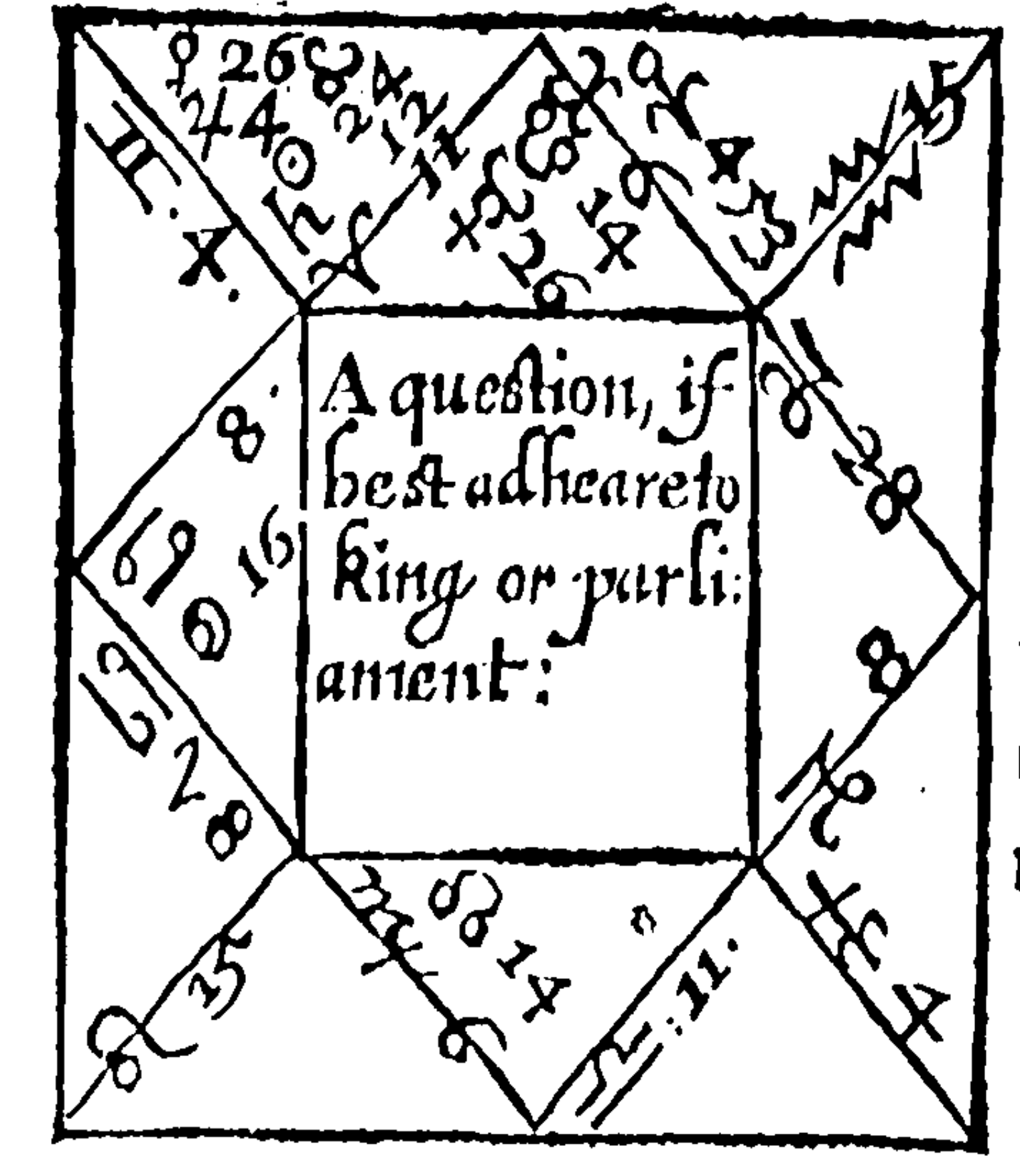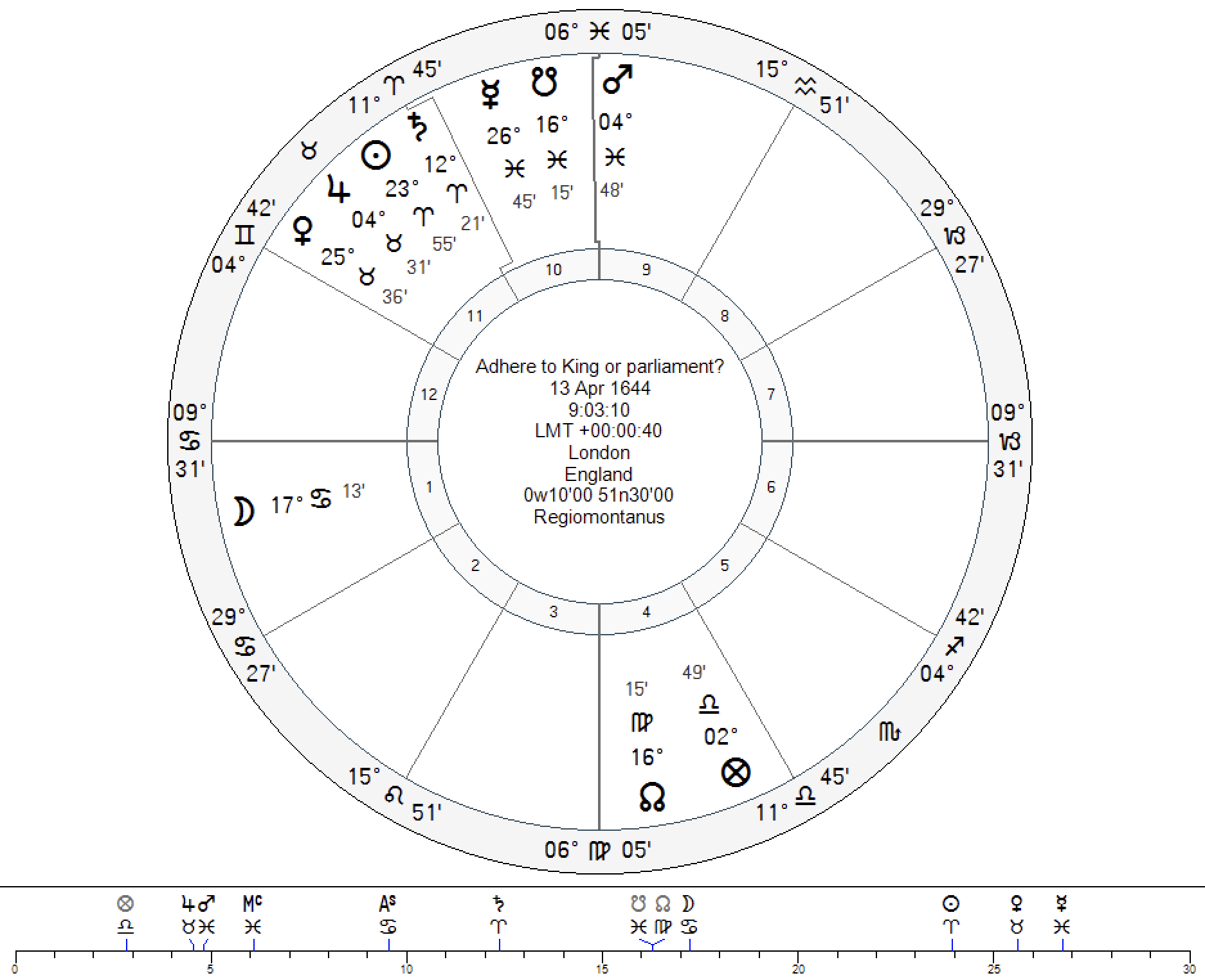
Astrological Counseling in Vienna
This blog post presents a historical horary horoscope that was originally published by William Lilly in "Anglicus or An Ephemeris for 1646" during the First English Civil War (1642-46). At that time, King Charles and the Parliamentarian army were at war, and people in England were forced to choose sides for various reasons. Men joined armies to defend religious freedoms, to display their loyalties and advance politically and financially, or to earn a steady income as soldiers if they were poor and disadvantaged.
The featured question was asked two years after King Charles had established his headquarters at Oxford. Lilly's analysis of the horoscope reveals that the person who asked the question was wealthy, lived in London, and considered joining the King's forces in Oxford but had concerns about how it might impact his wealth.
I retyped Lilly's original text, in which he outlines the main arguments for the judgment against the Querent's joining the King at Oxford. Following this, I have provided explanations of the astrological analysis. You will also find the modern horoscope that closely matches Lilly's printed original.
If you are looking for horary astrology advice, follow this link for more information on this topic.
A question if best to adhere to King or parliament?
Horary and judgment by William Lilly

The querent is signified by the Moon, and she being strong in the ascendant, and the question asked in London, did signify the place wherein he then was in, was most safe for him to abide in; her separation from the square of Saturn, did tell me the Gentleman was much afflicted in mind and had strong conflicts within himself which way to dispose his affairs: her application to a square of Sun, did make me confident to tell him his affection was wholly for Oxford, and he strongly resolved to be gone; I dehorted his going, having sufficient grounds in Art for my judgment; for finding Mercury and South Node in the tenth, and Sun and Saturn in the eleventh, I made it appear how his Majesties designs were betrayed, and his cause sinking; and that his own losses would be infinitely great, even to his utter impoverishment, if he declined not his present resolution, etc. I might deliver more, but let it suffice, the advice was not followed wholly or scarce at all, by which eight or ten thousand pounds are elapsed out of his estate.
Some explanations of the judgment
William Lilly concludes that despite a dilemma, the querent desires to join the King because Moon is moving toward the Sun, the natural significator of monarchs. In addition, there is a mutual reception between Moon and Jupiter, the ruler of the 10th house. This confirms the querent's inclination towards the King, who will readily accept support.

The judgment about King's financial and other affairs is based on the following significators: The 10th house represents King, while the 11th house illustrates his financial assets. Saturn governs the turned 12th house from the 10th and is located on the cusp of the turned 2nd house, indicating battered assets and diminished support for the King's cause.
For additional testimonies, Lilly looked at the position of Mercury in the 10th house and its rulership over the radical 4th, representing the King's enemies. Mercury is in detriment and fall, rules the radical 12th house of loss, adding his malefic influence to the already debilitating effect of the South Node. Despite this being a classical figure of emplacement, when in conflicting situations one significator is placed in the opponent's house and therefore defeated, Mercury nevertheless weakens the King and brings losses. That corroborates the previous testimonies.
While Moon applies to square the Sun, it translates the light from Saturn to the Sun, meaning that King's losses will negatively affect the Querent and his assets. And there is another testimony for the financial loss. The question implies the option of joining the King at Oxford and moving from London to another location, so the seventh house indicates the destination, and the 8th house represents Querent's finances at that place. However, the 8th house is ruled by Saturn, which is in the sign of its fall and accidentally debilitated by its proximity to the Sun, corroborating the loss should he leave for Oxford.
You may also find this interesting:
Astrology of the critical year: the passing away of Tina Turner and Silvio Berlusconi
Berlusconi and Pluto-Uranus square
Horoscope of a Gentleman from "English Phrophetical Merline" by William Lilly, 1644
Patrizia Reggiani Gucci: Astrological Insights into the Gucci Scandal
